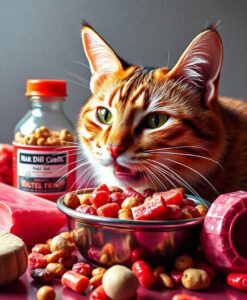Microbial contamination presents serious challenges for pets and their human families. Dangerous pathogens can silently inhabit what appears to be wholesome food, creating unexpected vectors for transmission that might compromise both animal and human health. These risks extend far beyond simple digestive concerns, potentially introducing serious infectious agents into household environments.

Understanding the complex ecosystem of pet nutrition requires nuanced consideration of safety protocols and scientific evidence. Veterinary researchers continue investigating how different feeding strategies impact companion animal wellness, reminding us that good intentions do not automatically translate into optimal health outcomes. For pet owners seeking deeper insights into responsible nutrition, this emerging research offers critical perspectives on balancing nutritional innovation with fundamental safety principles.
Commercial raw cat food, particularly products sold on shelves at room temperature, may pose a considerable health risk to cats and the families who care for them, according to an analysis of the products. The analysis detected disease-causing microbes, including some that…

